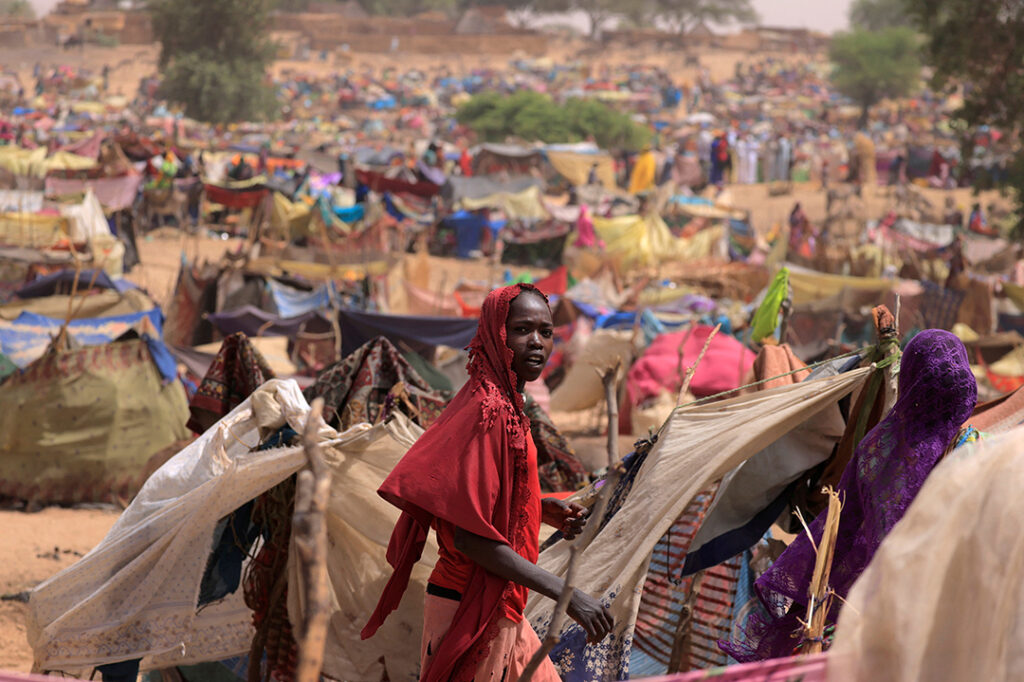ADF STAFF
With fighting between Sudan’s rival generals showing no signs of abating, experts are paying close attention to the possibility of the conflict spilling over into the Central African Republic (CAR) and Chad.
Sudan’s neighbors to the north and east also face spillover, but its western neighbors share unique ethnic ties, historical bonds, and the presence of rebels and Wagner Group mercenaries that could escalate into a regional conflict.
In addition, the CAR and Chad share a border with Sudan’s volatile Darfur region, where fighting has erupted in the past. Thousands of Sudanese already have fled to the CAR and Chad seeking refuge from the violence.
The CAR’s border with Central Darfur and South Darfur remains open, allowing the potential transfer of weapons and fighters supported by the Wagner Group, which is active on both sides of the border. Chad has closed its 1,400-kilometer border with Sudan to stifle the potential spread of violence. It’s unclear how well that will work in the historically porous border region.
“Despite their posture of neutrality, both countries could become embroiled in the Sudan conflict because of these cross-border community dynamics,” researchers Remadji Hoinathy and Yamingué Bétinbaye wrote recently for the Institute for Security Studies.
CAR: In the Central African Republic, the situation regarding Sudan is straightforward: “They are on the side of Hemedti,” Sudanese analyst Kholood Khair, director of the Khartoum think tank Confluence Advisory, told Middle East Eye recently.
Hemedti is the name used by head of the Rapid Support Forces (RSF), Gen. Mohamed Hamdan Dagalo. He has recruited fighters from the CAR and is in control the border at Um Dafuq. Hemedti and the CAR government share a common ally in the Wagner Group, which is deeply involved in gold mining on both sides of the border.
CAR rebels with the Coalition of Patriots for Change (CPC) have reported that Wagner fighters are sending weapons and reinforcements to the RSF though Um Dafuq. The two forces also have met on the border to work out what kind of support will come to the RSF through Um Dafuq.
“Our forces as CAR opposition are fighting Wagner and the CAR army forces, so we are also seeking coordination with the Sudanese army in order to stop the mutual support that CAR government, Wagner and RSF are providing to each other,” unidentified CPC sources told Middle East Eye.
Like the Chadian provinces to the north, the CAR’s Vakaga and Haute-Kotto prefectures have been the victims of violence by Janjaweed forces in the past. The RSF evolved from Janjaweed militias that were used by former Sudanese dictator Omar al-Bashir to put down rebellions in the Darfur region in 2003.
Chad: Chad is aligned with al-Burhan and the Sudanese Armed Forces (SAF) but remains officially neutral regarding Sudan’s conflict.
The government’s neutrality is complicated by Chadian leader Mahamat Déby’s familial connections to the Zaghawa ethnic group. The Zaghawa population lives on both sides of the Chad-Sudan border and includes a militia headed by North Darfur Gov. Suliman Arcua “Minni” Minnawi, an al-Burhan ally.
The RSF’s activities along the Chad-Sudan border over the past 20 years have earned it the animosity of Zaghawa and other communities there, experts say. Janjaweed militias that now make up the RSF have killed hundreds of people in the Wadi Fira, Ouaddai and Sila provinces that border Darfur.
Hemedti’s family originated in Chad, and he has a cousin who is a general in the Chadian military. Those connections raise the risk that Hemedti may meddle in Chad’s fragile politics. As a result, Déby and other Chadian officials are treading carefully regarding Sudan’s conflict, according to Jerome Tubiana, former Sudan analyst for the International Crisis Group (ICG).
“They will be more cautious with him than with the Sudanese army,” Tubiana told the ICG’s podcast “The Horn.” “The Sudanese army has no connections within Chad to directly interfere in Chadian politics.”
Déby, like his father before him, has shown himself to be adept at using ethnic connections to manage the politics of Darfur to prevent violence from spreading across the border, Tubiana said.
Sudan’s borders with the CAR and Chad — along with Egypt, Eritrea, Ethiopia and South Sudan — create the risk that the fight between al-Burhan and Hemedti will become a broader regional conflict.
“The collapse of Sudan actually connects all these isolated zones of turmoil into one,” Dr. Majak D’Agoôt, former deputy defense minister of South Sudan, said on the Africa Today podcast. “This is really going to have a very serious consequence on regional and international security.”

